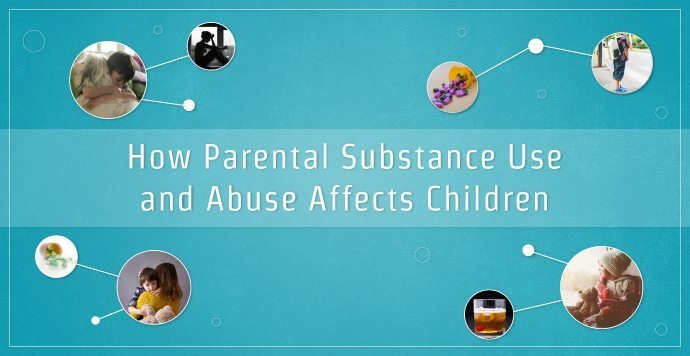How Parental Substance Use and Abuse Affects Children

When we see someone who uses drugs or alcohol, many times we only think of how the use of substances affects them, but, there is a MUCH bigger picture here. Substance users have families, they are parents, children, aunts, uncles, grandparents, and so on. So, when we see someone with a substance abuse problem, we need to realize he’s not only hurting himself, he is hurting those around him who love him the most. And because of this love, many times we enable the user even more because we are trying to protect him or we are afraid of what may happen if we don’t protect him or keep secrets.
For many of us, we don’t understand why people would put their addictions ahead of their children. But the problem is the parent it addicted! In the parent’s mind, the need for the substance is bigger than the responsibility of being a parent. Any addict is driven by a craving for his or her drug of choice.
Many ask, why can’t those addicted just stop? Don’t they see what they are doing is hurting their children? No, they don’t see it. They justify it. A user may say, “I can handle it,” “I am a good parent,” “I can stop if I really need to,” but what they don’t see is how this affects their children. Remember, just because they have a substance abuse issue doesn’t mean that they don’t love their children and they truly think they are a good parent.
Consequences Of Substance Use In The Home
In my office I regularly see these effects or shall we say “consequences.” For some users it means their children are removed by Child Protective Services (CPS) and placed into Foster Care. This then turns into a long, drawn out process of the parent trying to not only deal with their own addiction, and hopefully get help, but also to work with a system of hoop jumping in trying to get their children back. For some, they just give up and stop going through the hoops. They lose their children altogether.
Many do this dance if they clean up and they get their children back only to lose them again later. This turns into a back and forth chaos that becomes a child’s life. This chaos results in children who are scared and hurt not only by their parents but also by a system that is supposed to be designed to help them, but in some cases, hurts them as well.
 The children who stay at home with their substance using parents, in many cases turn into a caregiver. They are forced to care for not only the substance using parent but also for any siblings in the home. They may miss school because their parent it too high or hungover to drive them there. This is just “normal” and they adapt because they have to survive each day. These children develop problems with anxiety and stress because they worry about who will care for them and the other siblings. They basically turn into a parental figure and have to make adult decisions at a very young age.
The children who stay at home with their substance using parents, in many cases turn into a caregiver. They are forced to care for not only the substance using parent but also for any siblings in the home. They may miss school because their parent it too high or hungover to drive them there. This is just “normal” and they adapt because they have to survive each day. These children develop problems with anxiety and stress because they worry about who will care for them and the other siblings. They basically turn into a parental figure and have to make adult decisions at a very young age.
Another consequence of parents with substance use issues is that their children see that using substances is a “normal” way of coping with life’s problems. For many, the first time they begin using is at a young age because their addicted parent gives them substances or leaves drugs or alcohol unwatched and at arm’s reach.
Physical Repercussions Of Addicted Parent Against Child
 Children also become targets of their substance using parent. Meaning that in a blackout, a parent may abuse their children, hurting them not only physically but also mentally, and in some cases sexually. Children develop this fear and a “walking on eggshells” or hypervigilant feeling. They are very aware of their parents being high or drunk so they steer clear as much as they can.
Children also become targets of their substance using parent. Meaning that in a blackout, a parent may abuse their children, hurting them not only physically but also mentally, and in some cases sexually. Children develop this fear and a “walking on eggshells” or hypervigilant feeling. They are very aware of their parents being high or drunk so they steer clear as much as they can.
In some cases however, substance users’ motivations to stop and stay sober are their children. They realize what they have been doing is hurtful to not only themselves but those around them especially their children. They find ways to stay sober and take care of their children. For many who do, there is usually something that happens as a wake-up call. Perhaps they get in some sort of trouble and they have a consequence to their actions.
Making Amends During Recovery
 Once addicted parents decide they want to stay sober, they need to begin rebuilding their relationships with their families. They need to work on mending pain and distrust, making apologies where needed even to their children. Yes, children need to hear apologies from their addicted parents and see the resulting changes to uphold these apologies.
Once addicted parents decide they want to stay sober, they need to begin rebuilding their relationships with their families. They need to work on mending pain and distrust, making apologies where needed even to their children. Yes, children need to hear apologies from their addicted parents and see the resulting changes to uphold these apologies.
This can be done and for many families the way to do this is with some help from a good family counselor. The whole family needs to be involved in the therapy process in order to rebuild the family as a whole. It will take a lot of work and patience from everyone in the family. Some pain is deep and heavy and time is what is needed to heal the resulting wounds.
The parent with the substance abuse issue should receive individual counseling, as well as couples or marriage counseling with their partner. In many cases the children need a counselor to talk to as well; a good child therapist who is a neutral person helping to advocate for the adolescents and someone they can vent their frustrations to who can help them cope with their feelings.
 A parent who uses substances is not a “bad parent.” They are a person who needs help. They need help to be a better parent. They need help with their addiction and their children need help as well. The children– whether the parent decides to become sober or not –need help sorting out all their feelings and emotions surrounding their parent’s substance use and the consequences of that use. For many children, a person who will listen and help them is all they need to begin the healing process.
A parent who uses substances is not a “bad parent.” They are a person who needs help. They need help to be a better parent. They need help with their addiction and their children need help as well. The children– whether the parent decides to become sober or not –need help sorting out all their feelings and emotions surrounding their parent’s substance use and the consequences of that use. For many children, a person who will listen and help them is all they need to begin the healing process.




